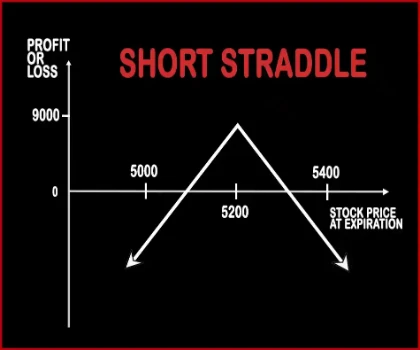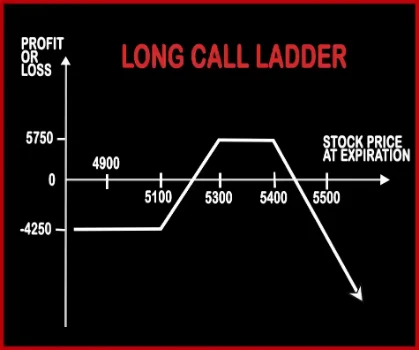Compare Strategies
| SHORT STRADDLE | LONG CALL LADDER | |
|---|---|---|

|

|
|
| About Strategy |
Short Straddle Option strategyThis strategy is just the opposite of Long Straddle. A trader should adopt this strategy when he expects less volatility in the near future. Here, a trader will sell one Call Option & one Put Option of the same strike price, same expiry date and of the same underlying asset. If the stock/index hovers around the same levels then both the options will expire worthless an |
Long Call Ladder Option StrategyLong Call Ladder Strategy is an extension to Bull Call Spread Strategy. A trader will be slightly bullish about the market, in this strategy but bearish over volatility. It involves buying of an ITM Call Option and sale of 1 ATM & 1 OTM Call Options. However, the risk associated with this strategy is unlimited and reward is limited. |
SHORT STRADDLE Vs LONG CALL LADDER - Details
| SHORT STRADDLE | LONG CALL LADDER | |
|---|---|---|
| Market View | Neutral | Neutral |
| Type (CE/PE) | CE (Call Option) + PE (Put Option) | CE (Call Option) |
| Number Of Positions | 2 | 3 |
| Strategy Level | Advance | Advance |
| Reward Profile | Limited | Unlimited |
| Risk Profile | Unlimited | Unlimited |
| Breakeven Point | Lower Breakeven = Strike Price of Put - Net Premium, Upper breakeven = Strike Price of Call+ Net Premium | Upper Breakeven Point = Total Strike Prices of Short Calls - Strike Price of Long Call - Net Premium Paid, Lower Breakeven Point = Strike Price of Long Call + Net Premium Paid |
SHORT STRADDLE Vs LONG CALL LADDER - When & How to use ?
| SHORT STRADDLE | LONG CALL LADDER | |
|---|---|---|
| Market View | Neutral | Neutral |
| When to use? | This strategy is work well when an investor expect a flat market in the coming days with very less movement in the prices of underlying asset. | This Strategy is an extension to Bull Call Spread Strategy. A trader will be slightly bullish about the market, in this strategy but bearish over volatility. |
| Action | Sell Call Option, Sell Put Option | Buy 1 ITM Call, Sell 1 ATM Call, Sell 1 OTM Call |
| Breakeven Point | Lower Breakeven = Strike Price of Put - Net Premium, Upper breakeven = Strike Price of Call+ Net Premium | Upper Breakeven Point = Total Strike Prices of Short Calls - Strike Price of Long Call - Net Premium Paid, Lower Breakeven Point = Strike Price of Long Call + Net Premium Paid |
SHORT STRADDLE Vs LONG CALL LADDER - Risk & Reward
| SHORT STRADDLE | LONG CALL LADDER | |
|---|---|---|
| Maximum Profit Scenario | Max Profit = Net Premium Received - Commissions Paid | Strike Price of Lower Strike Short Call - Strike Price of Long Call - Net Premium Paid - Commissions Paid |
| Maximum Loss Scenario | Maximum Loss = Long Call Strike Price - Short Call Strike Price - Net Premium Received | Price of Underlying - Upper Breakeven Price + Commissions Paid |
| Risk | Unlimited | Unlimited |
| Reward | Limited | Unlimited |
SHORT STRADDLE Vs LONG CALL LADDER - Strategy Pros & Cons
| SHORT STRADDLE | LONG CALL LADDER | |
|---|---|---|
| Similar Strategies | Short Strangle | Short Strangle (Sell Strangle), Short Straddle (Sell Straddle) |
| Disadvantage | • Unlimited risk. • If the price of the underlying asset moves in either direction then huge losses can occur. | • Unlimited risk. • Margin required. |
| Advantages | • A trader can earn profit even when there is no volatility in the market . • Allows you to benefit from double time decay. • Trader can collect premium from puts and calls option . | • Reduces capital outlay of bull call spread. • Wider maximum profit zone. • When there is decrease in implied volatility, this strategy can give profit. |